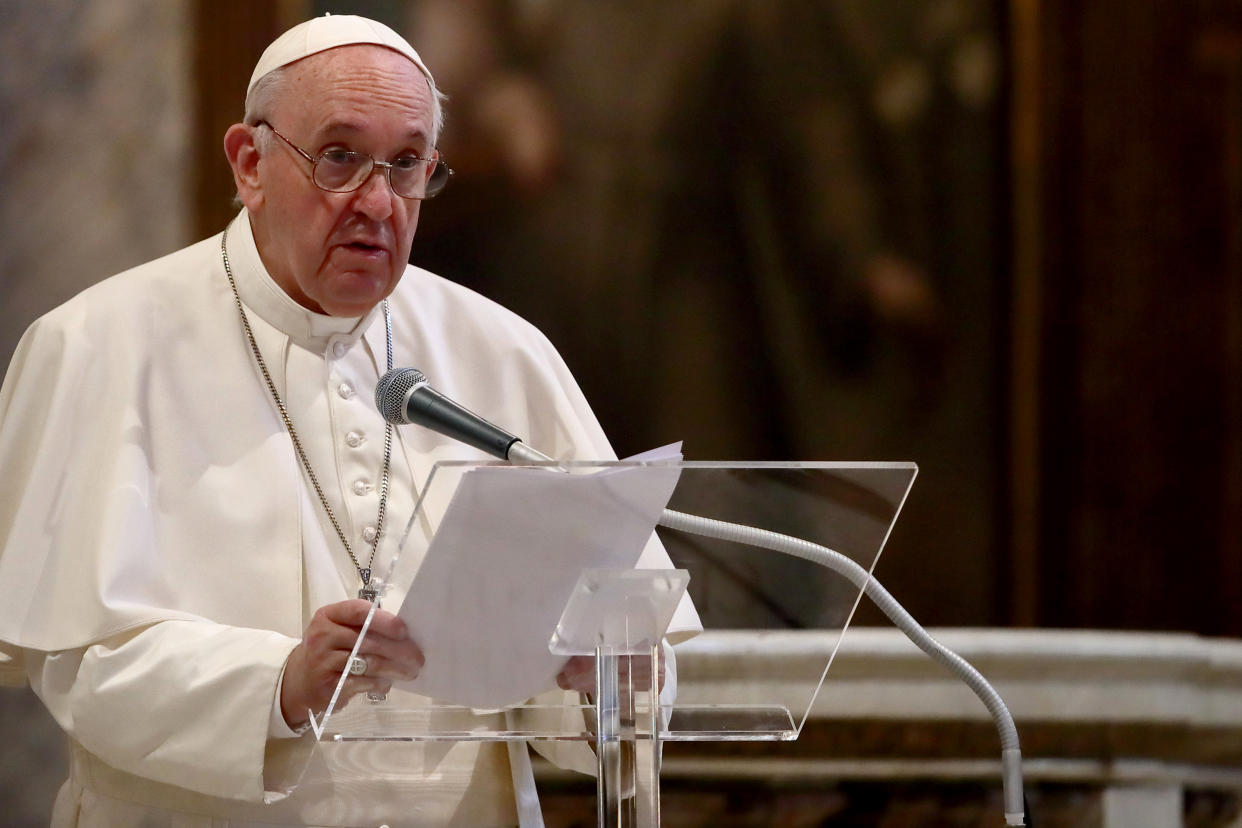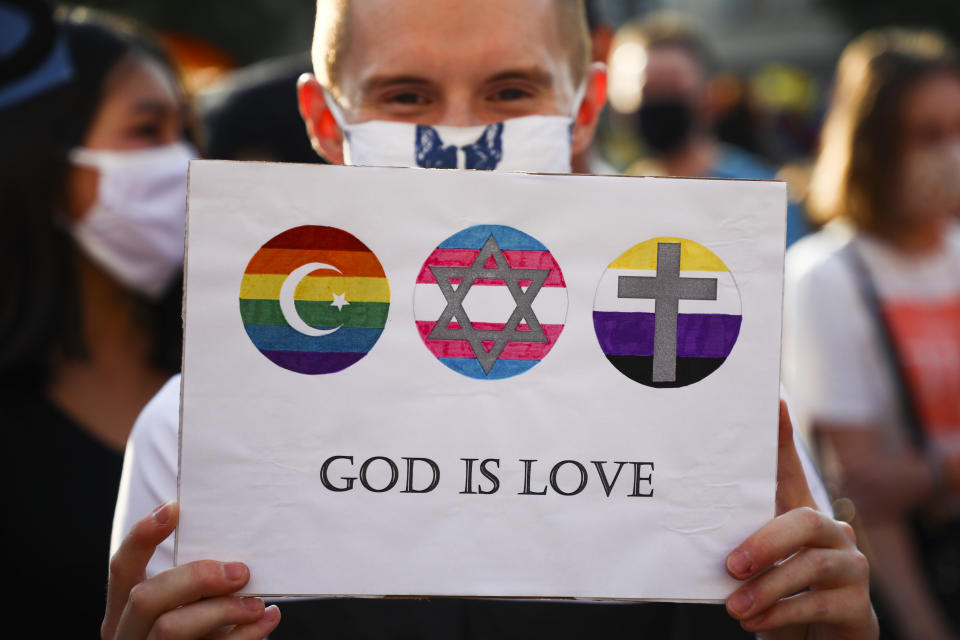After Pope Francis signals support for same-sex unions, LGBTQ Catholics react: 'Hallelujah'

The most supportive comments yet from Pope Francis regarding same-sex unions landed with welcome — if slightly skeptical — impact among many gay and lesbian Catholics in the U.S. this week.
“Homosexuals have a right to be part of the family,” the pontiff said in Francesco, a documentary about his life, by Evgeny Afineevsky, which debuted on Wednesday in Rome. “They’re children of God and have a right to a family. Nobody should be thrown out, or be made miserable because of it.” He added, “What we have to create is a civil union law. That way, they are legally covered. I stood up for that.”
The pope’s words were a powerful signal of acceptance that many say they have been waiting a very long time to hear. “Today the Pope changed so much. … These words matter,” tweeted James Longman, a correspondent with ABC News. “When you’re Catholic and gay, you can sometimes feel like you’re being pitied by other Catholics, even the most loving. Tolerated, but not fully accepted.”
I was raised Catholic & spent 10 years at a Catholic boarding school. My grandmother wore blue for Mary & said prayers for everything from long trips to finding her glasses. I’m proud of it, but as a gay man struggled to reconcile these identities
Today the Pope changed so much— James Longman (@JamesAALongman) October 21, 2020
Others on social media expressed relief after being “institutionally educated to hate myself,” and, while commenting on a popular Katie Couric post celebrating the news, noted that it “brought me to tears,” that they “grew up Catholic and queer and never thought I’d see this day,” and that, “As the mother of a gay son, I’m always thrilled when positive changes happen. My son deserves the same rights as yours. Regardless of who he loves.”
I was raised Catholic & spent 10 years at a Catholic boarding school. My grandmother wore blue for Mary & said prayers for everything from long trips to finding her glasses. I’m proud of it, but as a gay man struggled to reconcile these identities
Today the Pope changed so much— James Longman (@JamesAALongman) October 21, 2020
To explain my tweet from yesterday, the past 21 years of my education have been in Roman Catholic/Jesuit institutions. In all of those institutions I, as a gay man, was institutionally educated to hate myself and how I felt. I was told I was unnatural and that I was ill. 1/2
— marco (@BensonMarco) October 22, 2020
“My reaction was, ‘Hallelujah,’” Francis DeBernardo, executive director of New Ways Ministry, a national LGBTQ Catholic advocacy organization, tells Yahoo Life. “Because LGBTQ people — and many, many Catholics — have been waiting for a statement like this for so long. … It’s going to bring an incredible amount of positive change in the church. People who have been afraid to speak up will start speaking up. And it will bring a lot of good on a local level, where LGBTQ people may have been hidden or experienced discrimination — kids of lesbian parents not being admitted to Catholic school, babies not baptized … couples being excluded from marriage preparation or bereavement courses in parishes.”
Maura Topper, a producer of the 2015 documentary film Owning Our Faith, exploring the complexities of being both Catholic and LGBTQ, mainly through the LGBTQ ministry at Church of St. Paul the Apostle in New York City, tells Yahoo Life that the pope’s pronouncement gave her a sense of “thankfulness and hopefulness.”
Though she had a relatively smooth coming-out in her 20s thanks to the welcoming parish of St. Paul the Apostle — and even met her now-wife there — the women are now living in Pennsylvania, where some of their experiences as lesbian Catholics have “not [been] as welcoming or open.” Since the pope’s public embrace, Topper has felt “a shift in the way I’m able to speak to the world around me, in terms of having dialogue with families who don’t think I should be a lector [at Church],” she says. “It feels like a little bit of an extra tool in the tool belt.”
Last weekend 68 LGBT Catholics from @outatstpaul journeyed together on its annual retreat. It keeps getting better! pic.twitter.com/eAKC08Z0gZ
— OwningOurFaith (@OwningOurFaith) March 3, 2016
But also, Topper says, she understands the even bigger importance the pope’s words could have outside of this country. “I own that … as a white female U.S. resident … while the rest of my life is not terribly impacted, I think it carries a tremendous amount of weight around the world — in Poland, parts of Southeast Asia. So, to hear Pope Francis say those words, it should be a real challenge to the Catholic Church to rethink the language, and how negative we’re being.”
Santiago Rivera, a Brooklyn architect and former LGBTQ ministry team leader at St. Paul the Apostle, was born and raised in a conservative city in Mexico and is a lifelong Catholic. He agrees that it’s important to hear the pope’s comments from a non-Western perspective. “We live in a country where being gay is generally accepted, it’s part of our culture. … But look at what is happening in Poland, it’s not the case there. Look at what happens in African countries, in some Asian countries,” he tells Yahoo Life.
“If you read that message as a gay teenager in Poland or a lesbian in Uganda, that has so much more power than it does in the U.S. right now,” he says. “That’s where our focus should be … on the message that ‘you are not a crime, you should not be persecuted,’ and the impact that that’s having.”

Still, he can’t help feeling some of that impact himself, especially remembering how he felt as a young, just-out gay man who had come to New York for college, randomly attending a Mass at St. Paul’s. “At the end of Mass, I hear something about this LGBTQ ministry, and I was so surprised, I had never heard of such a thing. I thought, am I in a Catholic church or an Episcopalian church? I had never thought my Catholic faith and my sexuality could be an intersection at any point.”
Before that day, Rivera recalls, “I think I just felt I wasn’t accepted as a whole.” And during his difficult coming out years, he says, despite the struggles he felt, “I was very at peace with it. It was the institution of the church that made me feel like maybe I’m not welcome here.” It was at St. Paul the Apostle, he says, where he heard, ‘‘Wherever you are in your faith journey, you have a place at the church.’ That should be the message of Catholicism.”
A post shared by DignityUSA (@dignityusa) on
Some, however, feel that message isn’t always there — and are reacting to Pope Francis’s message with an abundance of caution.
Matthew Putorti, a lifelong Catholic who appeared in Owning Our Faith, tells Yahoo Life, “I’m approaching it with a little bit of hesitation. … But if it is what it appears to be, I think it’s very exciting. Things tend to move, if at all, glacially in the Catholic church, and this would be a very monumental shift. I’m also not a theologian, but I don’t think this alters Catholic teachings. But what it does is in a very pastoral way, recognizes the love that LGBT people deserve and that that love is no different than what everybody else deserves.”
Marianne Duddy-Burke is the executive director of Dignity USA, an LGBTQ Catholic support and advocacy organization. Upon hearing about the pope’s comments, she tells Yahoo Life, “I experienced a range of emotions. I’ve been involved in this work for a really long time, so I definitely feel like I understand the importance that it could have — but also the danger, if this is put out publicly and then walked back. I’ve seen too many times LGBTQ people and our families hearing something positive and welcoming and then having it walked back later. And each time that happens, it’s sort of the last straw for people in their relations with the church, and sometimes with God. It’s very damaging. There are folks who have tried really hard to hang in there … then it’s just a breaking point.”
Still, she appreciates the excitement over what Pope Francis’s words could mean globally. “I know people from all over the world who have absolutely no legal protection where they live, who have been beaten, have had acid thrown at them, whose families have turned them out … and the sense that there is a possibility that this could be an opening that provides some sort of legal protection for these people — how can you not hope for that? The pope’s words have a lot of power.”
Read more from Yahoo Lifestyle:
Want lifestyle and wellness news delivered to your inbox? Sign up here for Yahoo Life’s newsletter.

